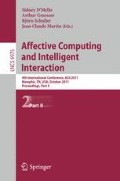Abstract
Evidence of the strong relationship between learning and emotion has fueled recent work in modeling affective states in intelligent tutoring systems. Many of these models are designed in ways that limit their ability to be deployed to a large audience of students by using expensive sensors or subject-dependent machine learning techniques. This paper presents work that investigates empirically derived Bayesian networks for prediction of student affect. Predictive models are empirically learned from data acquired from 260 students interacting with the game-based learning environment, Crystal Island. These models are then tested on data from a second identical study involving 140 students to examine issues of generalizability of learned predictive models of student affect. The findings suggest that predictive models of affect that are learned from empirical data may have significant dependencies on the populations on which they are trained, even when the populations themselves are very similar.
Access this chapter
Tax calculation will be finalised at checkout
Purchases are for personal use only
Preview
Unable to display preview. Download preview PDF.
References
Conati, C., Maclaren, H.: Empirically Building and Evaluating a Probabilistic Model of User Affect. User Modeling and User-Adapted Interaction 19(3), 267–303 (2010)
Burleson, W.: Affective Learning Companions: Strategies for Empathetic Agents with Real-Time Multimodal Affective Sensing to Foster Meta-Cognitive and Meta-Affective Approaches to Learning, Motivation and Perseverance. PhD thesis, Massachusetts Institute of Technology (2006)
McQuiggan, S., Lee, S., Lester, J.: Early prediction of student frustration. In: Paiva, A.C.R., Prada, R., Picard, R.W. (eds.) ACII 2007. LNCS, vol. 4738, pp. 698–709. Springer, Heidelberg (2007)
Marsella, S., Gratch, J.: EMA: A Process Model of Appraisal Dynamics. Cognitive Systems Research 10(1), 70–90 (2009)
Paiva, A., Dias, J., Sobral, D., Aylett, R., Sobreperez, P., Woods, S., Zoll, C., Hall, L.: Caring for Agents and Agents that Care: Building Empathetic Relations with Synthetic Agents. In: Proc. of the 3rd Intl. Joint Conf. on Autonomous Agents and Multiagent Systems, pp. 194–201 (2004)
de Vicente, A., Pain, H.: Informing the detection of the students’ motivational state: An empirical study. In: Cerri, S.A., Gouardéres, G., Paraguaçu, F. (eds.) ITS 2002. LNCS, vol. 2363, pp. 933–943. Springer, Heidelberg (2002)
Beal, C., Lee, H.: Creating a Pedagogical Model That Uses Student Self Reports of Motivation and Mood yo Adapt ITS Instruction. In: AIED 2005 Workshop on Motivation and Affect in Educational Software (2005)
Kort, B., Reilly, R., Picard, R.: An Affective Model of Interplay Between Emotions and Learning: Reengineering Educational Pedagogy—Building a Learning Companion. In: Proc. IEEE Intl. Conf. on Advanced Learning Technology: Issues, Achievements and Challenges. IEEE Computer Society, Madison (2001)
Picard, R., Papert, S., Bender, W., Blumberg, B., Breazeal, C., Cavallo, D., Machover, T., Resnick, M., Roy, D., Strohecker, C.: Affective Learning – A Manifesto. BT Technology Journal 22(4) (2004)
Arroyo, I., Cooper, D., Burleson, W., Woolf, B., Muldner, K., Christopherson, R.: Emotion Sensors Go to School. In: Proc. of the 14th Intl. Conf. on Artificial Intelligence in Education, pp. 17–24 (2009)
D’Mello, S., Graesser, A.: Multimodal Semi-Automated Affect Detection from Conversational Cues, Gross Body Language, and Facial Features. User Modeling and User-Adapted Interaction 20(2), 147–187 (2010)
Elfenbein, H., Ambady, N.: On the Universality and Cultural Specificity of Emotion Recognition: A Meta-Analysis. Psychological Bulletin 128, 203–235 (2002)
Picard, R., Vyzas, E., Healey, J.: Toward Machine Emotional Intelligence: Analysis of Affective Physiological State. IEEE Transactions on Pattern Analysis and Machine Intelligence 23(10), 1175–1191 (2001)
Kolodyazhniy, V., Kreibig, S., Gross, J., Roth, W., Wilhelm, F.: An Affective Computing Approach to Physiological Emotion Specificity: Toward Subject-Independent and Stimulus-Independent Classification of Film-Induced Emotions. Psychophysiology 48, 908–922 (2011)
Chen, L.: Joint Processing of Audio-Visual Information for the Recognition of Emotional Expressions in Human-Computer Interaction. Ph.D. Thesis, University of Urbana-Champaign (2000)
Elliot, A., Pekrun, R.: Emotion in the Hierarchical Model of Aproach-Avoidance Achievement Motivation. In: Schutz, P., Pekrun, R. (eds.) Emotion in Education, pp. 57–74. Elsevier, London (2007)
Sabourin, J., Mott, B., Lester, J.: Modeling Learner Affect with Theoretically Grounded Dynamic Bayesian Networks. In: ACII 2011, Part II. LNCS, vol. 6975, pp. 286–295. Springer, Heidelberg (2011)
Russell, S., Norvig, P.: Artificial Intelligence: A Modern Approach, 2nd edn. Pearson, London (2003)
Author information
Authors and Affiliations
Editor information
Editors and Affiliations
Rights and permissions
Copyright information
© 2011 Springer-Verlag Berlin Heidelberg
About this paper
Cite this paper
Sabourin, J., Mott, B., Lester, J.C. (2011). Generalizing Models of Student Affect in Game-Based Learning Environments. In: D’Mello, S., Graesser, A., Schuller, B., Martin, JC. (eds) Affective Computing and Intelligent Interaction. ACII 2011. Lecture Notes in Computer Science, vol 6975. Springer, Berlin, Heidelberg. https://doi.org/10.1007/978-3-642-24571-8_73
Download citation
DOI: https://doi.org/10.1007/978-3-642-24571-8_73
Publisher Name: Springer, Berlin, Heidelberg
Print ISBN: 978-3-642-24570-1
Online ISBN: 978-3-642-24571-8
eBook Packages: Computer ScienceComputer Science (R0)

